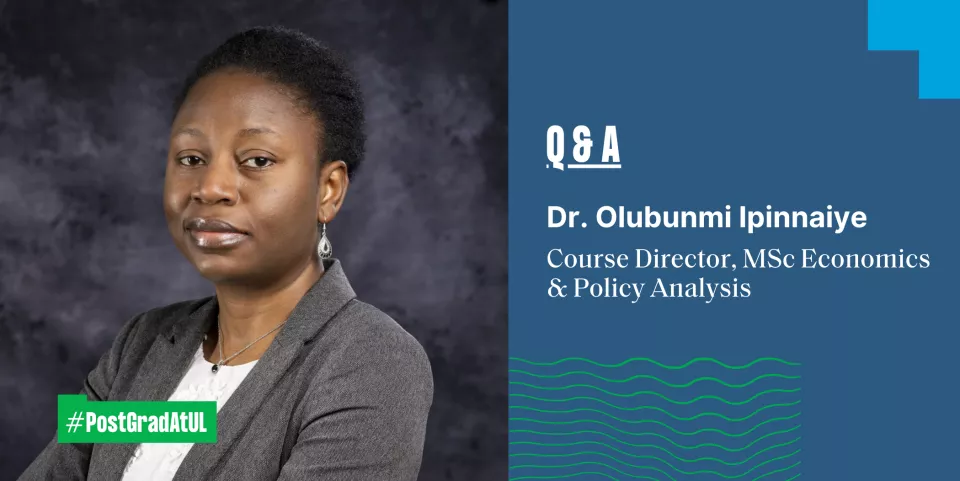

Dr. Olubunmi Ipinnaiye is a lecturer in Economics at the Kemmy Business School, University of Limerick. She studied Agricultural Economics at the University of Ibadan, Nigeria, and obtained a M.Sc. in Economic Policy and International Business from the University of Birmingham. She also received a PhD in Economics from the University of Limerick. Her research interests include drivers of firm performance, economics of innovation, policy evaluation, sustainability and public policy issues.
In this Q&A session, Olubunmi shares a deeper understanding of the MSc Economics & Policy Analysis and the opportunities it presents for aspiring economists and policy analysts.
1. What inspired your interest in the field of Economics?
Economics has always fascinated me because it is a practical subject with a recurring theme - choices and related trade-offs - that resonates with every stratum of society (i.e. individuals, households, firms and government). Coming from a developing country background further motivated my desire to study Economics and undertake research that delivers practice and public policy insights.
2. What are the key objectives and focus areas of the MSc in Economics & Policy Analysis programme at the University of Limerick?
The key objectives of the MSc in Economics and Policy Analysis programme are to equip students with the essential knowledge and skills required for a career in economics. The programme also has a strong applied public policy focus.
3. What are some of the key skills and competencies that students can expect to develop through the MSc in Economics & Policy Analysis programme?
Students who undertake the MSc Economics and Policy Analysis programme can expect to develop applied economic skills in data analysis, econometrics and policy analysis.
4. Can you talk more about the Double Degree Option in this MSc?
The MSc Economics and Policy Analysis programme is the first and only Masters in Economics in Ireland that offers the potential to obtain a dual degree. The MSc programme offers a number of students the unique opportunity to undertake a semester of study at the University of Liège Business School. Such students will undertake two semesters in UL, a further semester at the University of Liège, and complete a dissertation which is jointly supervised by faculty from UL and Liège. On completion, students receive two distinct Master degrees –MSc. in Economics and Policy Analysis from the University of Limerick and a Masters in Economics from the University of Liège.
5. What level of balance is there on the programme modules with regards to the field of Economics and the field of Policy?
The programme aims to maintain a healthy balance between economic theory and policy, by combining a core theoretical foundation with a strong applied policy focus. Students benefit from interactions with faculty members who have a proven track record of undertaking research that delivers both policy and practice impacts. Students are further exposed to cutting edge research and policy interventions through guest lectures given by policy-facing economists and international researchers.
6. How do you envision the future of economics and policy analysis, and how does the MSc programme prepare students to navigate this evolving landscape?
Global challenges such as inflation, climate change, aging population, artificial intelligence, green and digital transition, mean that there will always be a need for trained economists to provide evidence-based public policy guidance. The MSc programme is quite responsive to the changing landscape and is proactive in preparing students for positions requiring the application of economic knowledge and skills. For instance, the programme has been recently revised with the introduction of new modules such as Health Economics and The Economics of Global Challenges, which provide students with the requisite knowledge and skills to navigate these changes.
7. What career opportunities are open to students upon completion of the programme.
Graduates from the MSc programme are well-equipped to work as Economists in various areas such as the civil service, central bank, state bodies, regulatory authorities, banks and other financial institutions, universities and other research institutions.
Curious about the Masters in Economics and Policy Analysis?
